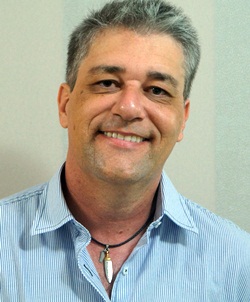 |
|
Marco Tulio
Michalick
(photo), from
Belo Horizonte,
in the Brazilian
state of Minas
Gerais, lives in
Brasília, where
he works as a
volunteer at the
Spiritist Centre
Lar da
Santíssima
Trindade (CELST).
His new book is
a collection of
short stories
and reflections
on the virtues
it encourages:
courage, hope
and faith:
How and when did
you become a
Spiritist?
When I was
seven-years-old
in Belo
Horizonte, I
began have
epileptic
seizures – up to
22 a day. After
failing to get
results from
conventional
medicine, I
|
|
|
was treated by
some family
friends,
Spiritists, who
came to our
house to give me
healing. After a
spiritual
operation, I had
an immediate
result, and the
fits stopped. I
joined a local
Spiritist Centre
when I was 12
and never again
left the
Doctrine. |
How about your
passion for
writing?
That began when
I was really
young, first in
school
compositions.
Then I began
writing fiction
and eventually,
in 2002,
published my
first Spiritist
book, in 2002,
Histórias de
Alexander.
What aspect of
Spiritist means
the most to
you?
Spiritism is a
complete
doctrine, with
its three
aspects:
science,
philosophy and
religion, which
make an
unbreakable
chain. In
What is
Spiritism?
Allan Kardec
tells us that
Spiritism is at
the same time an
observation
science and a
philosophical
doctrine. In
The Spirits’
Book he adds
that “Spiritism
is strong
because its
bases are those
of religion
itself, namely,
God, the soul,
the rewards and
punishments of
the future;
because it shows
those rewards
and punishments
to be the
natural
consequences of
the earthly
life; and
because, in the
picture it
presents of the
future, there is
nothing which
the most logical
mind could
regard as
contrary to
reason.”
Your latest book
brings us
important
reflections on
how to overcome
unexpected
troubles. Tell
us how you chose
those themes for
the book.
These are
special themes,
as they are part
of our
self-discovery
towards progress
and evolution.
How many times
we come about
perfectly
healthy people
who constantly
complain about
their imaginary
problems and
create a very
difficult
situation for
them? Meanwhile,
people with
serious physical
and mental
disabilities,
manage to
overcome their
handicaps, in a
positive
attitude that
embarrasses us
and lead us to
question our
inner
determination to
face our own
crises.
Tell us about
courage as a
virtue.
We usually
believe that
courage is the
absence of fear,
when in fact it
is the virtue
that pushes us
into action in
spite of fear.
Courage, added
to hope and
faith, provides
us with the
inner strength
to face our
challenges in a
firm and
decisive
manner.
What about
hope?
Hope is a virtue
that requires
the courage of
persevering, in
other words,
never giving up
on trying. Hope
and faith
together stop us
feeling empty or
sad when faced
with the
inevitable
challenges of
life. If death
takes away, back
to the Spiritual
World, someone
we love, hope
will give us
console, as we
know the
separation will
be a temporary
one. I often say
that we must
never take hope
away from
anyone, as it
may well be the
only thing
they’ve got
left.
How about faith,
particularly
reasoned faith
as defended by
Spiritism?
Blind faith
leaves people
vulnerable to
manipulation,
while reasoned
faith demands
study,
meditation, in
the search for
logical answers.
That is
something
Spiritism
provides,
leaving no room
for doubts or
misinterpretations.
Kardec says in
The Gospel
According to
Spiritism
that “hope and
charity are
inferences of
faith and all
three together
form an
inseparable
trinity.”
How has your new
book been
received?
Very well! The
book launch was
on September 5th,
and we got a
good deal of
publicity. Some
people have come
back to me to
tell me they
liked the fact
that the themes
are very
up-to-date. They
also like the
real stories
that illustrate
the chapters, as
they help
readers
empathize.
What else would
you like to
add?
I’d like to say
that I’m very
happy with the
book, which was
written with the
assistance,
through
intuition, of
many Spiritual
friends. The
main aim of the
book is to
discuss, in
plain language,
our daily doubts
and challenges.
It should
encourage
readers to
question their
perception of
themselves and
provide answers
on how to act. I
must also thank
Richard
Simonetti,
author and
Spiritist
speaker, for his
generosity and
patience,
helping me
during the
process of
writing the book
and playing a
big part in its
success.